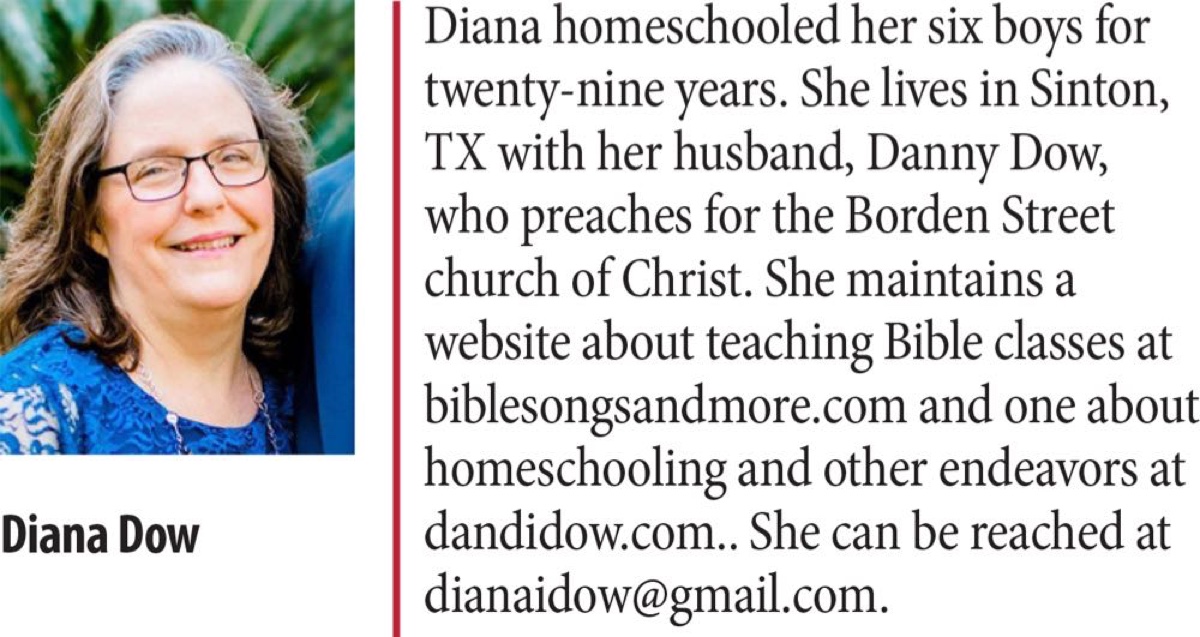By Diana Dow
Synopsis: Choosing an appropriate curriculum is a challenge that all homeschool families face. (Article #6 in this series)
What is the most common topic among homeschool moms? Curriculum. Which one do you use? Have you tried this one? For a new homeschool mom, this topic is daunting. Before jumping in feet first, the wise homeschool mom will educate herself about different learning styles and philosophies of education. Teacher lingo? Yes. Yet, learning basic terminology used in education will aid in the search for the “perfect curriculum.”
Learning styles describe the way a child learns.
Is he the quiet book learner? Visual
Is he a hands-on learner who must get his whole body involved in the process of learning? Kinesthetic
Is he the talkative learner who must verbalize everything before it sticks? Auditory
The younger child will more likely learn to use all three styles while the older child gravitates towards one. As the parent, you will become aware, through observation and experience, of how your child learns.
Philosophy of education asks, “How do I want to teach?”
Do I want my child to decide what, when and how he will learn? Unschooling.
Do I want my child to study all the academic subjects revolving around his current interest? Unit Studies.
Do I want my child to follow in the steps of the influential thinkers—Plato, Aristotle, etc., learning the trivium (Grammar, Logic, Rhetoric)? Classical Education.
Do I want my child to enjoy a feast of literature, appreciate nature, and study the arts? Charlotte Mason.
Do I want my child to use standard curriculum textbooks (using digital or paper resources) as taught in most schools? School at Home.
Am I intrigued by portions of each of these and would like my child to have a little of this and a little of that? Eclectic.
Once the child’s learning style and the teacher’s philosophy of education is determined, the quest begins. Curriculum choices vary from time to time. Someone comes up with a new idea on how to teach a subject and publishes it to share with others. Someone else determines merely to repackage what has been taught for ages. What is readily available now may be out of print next year. Curriculum can be faddish or time-proven, expensive or free, time-consuming or ready to go out of the box. Soliciting advice from homeschool veterans, researching on the internet and attending homeschool conferences will help in the search.
Notice in the three ways just listed to learn about curricula, all three of the learning styles are present: seeking advice—auditory, internet research—visual, attending conferences—kinesthetic. Which of these appeals to you? In homeschooling your child, you will learn a lot about yourself.
It is important to recognize that all curricula has an agenda. Everyone has an opinion they want to share with, or sell to, others. Being aware of this can help narrow the choices available to you. There are companies who call themselves Christian who may or may not agree with scripture. There are secular companies who may be neutral or may be overtly anti-God. Educate yourself about the background of the author/publishing company.
Keep in mind that whatever curriculum you choose, it is just a guide. Do not let your curriculum become your master. Let your child progress at his own pace. Take diversionary sidesteps when the opportunity arises. There is no need to finish a textbook before going on to the next. You are the teacher. The curriculum is there to help, not control.
About that “perfect curriculum” mentioned earlier? Say it with me, “There is no perfect curriculum. There is no perfect curriculum.” The search for it is vain. Ask me how I know. Just because it is new, or expensive, or my friends use it does not make it better than the one I already own. With consistent guidance from a loving parent, any curriculum can be the “perfect curriculum.” Look for something that will not break the bank, will inspire you to want to learn alongside your child, and will give your child the freedom to learn while you train him in the way he should go.
Train up a child in the way he should go, and when he is old, he will not depart from it (Prov. 22:6).


